The objective of this study was to determine if pregnant, literate women and female community health volunteers (FCHVs) in Nepal can accurately determine a woman’s eligibility for medical abortion using a toolkit, compared to comprehensive-abortion-care-trained providers.
The Youth Focused Social Network Initiative was a program to increase young women’s knowledge of and skills in accessing comprehensive abortion care in Rupandehi, Nepal from 2012-2014. The program trained peer educators to provide information and support related to comprehensive abortion care and encouraged adults to support youth in their communities. This study evaluated the effectiveness of the program and found that it had produced positive results in youth knowledge of and attitudes about comprehensive abortion care. Program expansion should be considered in light of continued need in Nepal.
This paper reports the results of an intervention with 3,471 abortion providers in India, Nepal and Nigeria. Following abortion care training, providers received in-person visits and virtual contacts by a clinical and programmatic support team for a 12-month period. The intervention also included technical assistance to and upgrades in facilities where the providers worked.
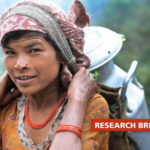
Since the liberalization of Nepal’s abortion law in 2002, intensive provider training and facility support have proven successful strategies for increasing the availability of comprehensive abortion care (CAC) services in the country. However, little is known about the pathways through which women access safe abortion services. This publication presents research on how women in Nepal access safe abortion information and services, including evidence-based recommendations indicating that increasing contraceptive education and access to female community health volunteers can improve women’s ability to manage their reproductive health.
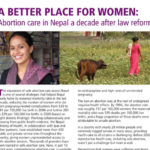
This publication highlights the work in Nepal since legal reform a decade ago and puts a spotlight on the key ingredients for successful scale-up of abortion care, including partnerships with government and NGOs and integration of abortion within the country’s Safe Motherhood program.
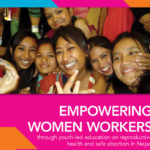
From 2011-2012, Ipas and our partners implemented a series of classes on sexual and reproductive health and rights (SRHR)—including information on safe abortion—for women who work at factories across Nepal’s Kathmandu Valley. This report explains how our project increased women workers’ knowledge of SRHR topics so they can better manage their own health and relationships and serve as resources for their families and communities. The report includes background information on Ipas’s work with youth, the context of sexual and reproductive health services for women workers in the Kathmandu Valley, details on the project’s various components, and explanation of key outcomes.
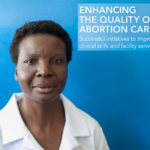
This report looks at initiatives in four countries—Nigeria, Nepal, Ghana and Zambia—where Ipas is working with governments, communities and other partners to provide clinical and programmatic support to providers and health-care facilities.
Comprehensive abortion care services remain out of reach for many women in rural and remote areas of Nepal. This article describes a training and support strategy to train auxiliary nurse-midwives (ANMs), already certified as skilled birth attendants, as medical abortion providers and expand geographic access to safe abortion care to the community level in Nepal.
Contraception is an essential element of high-quality abortion care. However, women seeking abortion often leave health facilities without receiving contraceptive counselling or methods, increasing their risk of unintended pregnancy. This paper describes contraceptive uptake in 319,385 women seeking abortion in 2,326 public-sector health facilities in eight African and Asian countries. Ministries of Health integrated contraceptive and abortion services, with technical assistance from Ipas. Overall, postabortion contraceptive uptake was 73 percent. The findings demonstrate high contraceptive uptake when it is delivered at the time of the abortion, a wide range of contraceptive commodities is available, and ongoing monitoring of services occurs.
Abortion has been legal in Nepal since 2002, and post-abortion care has been successfully integrated into hospitals. But that does not mean that women can easily obtain safe abortion services. The barriers are many, and women are often stigmatized for the decision to end a pregnancy.
The stigma that often surrounds abortion and anyone associated with it—women, providers, pharmacists and advocates—contributes to abortion’s social, medical and legal marginalization. At Ipas, we know that stigmatizing abortion is inherently harmful to women’s health — preventing them from getting the care they deserve.
Unsafe abortion’s significant contribution to maternal mortality and morbidity was a critical factor leading to liberalization of Nepal’s restrictive abortion law in 2002. Careful, comprehensive planning among a range of multisectoral stakeholders, led by Nepal’s Ministry of Health and Population, enabled the country subsequently to introduce and scale-up safe abortion services in a remarkably short timeframe. This paper examines factors that contributed to rapid, successful implementation of legal abortion in this mountainous republic, including deliberate attention to the key areas of policy, health system capacity, equipment and supplies, and information dissemination.
Despite liberalization of the Nepal abortion law, young women continue to experience barriers to safe abortion services. This study evaluated differences in reproductive knowledge and attitudes by marital status. Participants were surveyed on demographics, romantic experiences, media habits, reproductive information, and abortion knowledge and attitudes. Only 45% responded that they knew that abortion was legal, and fewer ever-married women were aware of abortion legality. Never-married women expected more negative responses from having an abortion than ever-married women. Findings highlight the need for providing sexual and reproductive health care information and services to young women regardless of marital status.

The Helms amendment is a law barring U.S. foreign assistance from being used for abortion services. This fact sheet describes the negative impact of the Helms amendment in Nepal. The country liberalized its abortion law in 2002 and the right to safe motherhood and reproductive health was guaranteed by the 2015 Constitution. In 2018 the Right to Safe Motherhood and Reproductive Health Act further ensured that women and girls in Nepal have the right to access safe, legal abortion free of charge at public health facilities. Yet due in great part to U.S. funding restrictions like the Helms Amendment, Nepal’s reproductive health care provision is fragmented and needlessly inefficient, putting the most burden on women and girls seeking abortion care.
This paper assesses women’s awareness of the liberalization of abortion law and their knowledge of a place for obtaining abortion services in Nepal. The data are from the 2011 Nepal Demographic and Health Survey. The results are compared with data from a similar survey conducted in 2006. The results suggest the need to intensify efforts to educate women in Nepal, particularly the most disadvantaged women, about abortion law, including the conditions under which abortion is permitted, and where to access safe abortion services.
Where abortion is illegal, women suffer. Before 2002 when abortion was illegal in Nepal, women were imprisoned, half of all hospital admissions were due to complications from clandestine abortions, and hundreds of women died each year.
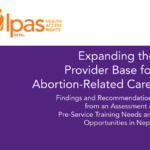
In 2012, Ipas undertook an assessment in Bangladesh, India, Nepal and Pakistan to determine the specific needs and gaps in the pre-service education systems for midlevel providers and to identify opportunities, strategies and recommendations for creating more equitable access to safe abortion care. Sources for the pre-service assessment include curricular review; government documents; key informant interviews; reports; assessments of provider performance and training; and site observation visits. The assessment results and recommendations in this report focus on Bangladesh.
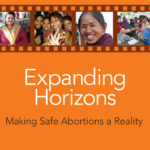
This publication highlights the critical role Ipas Nepal has played in the introduction and expansion of safe abortion services in Nepal since 2002, when abortion was decriminalized. Between July 2011 and December 2013, services provided in Ipas intervention facilities averted an estimated 50 maternal deaths, more than 22,000 unsafe abortions, and saved more than $450,000 in direct health-care costs.
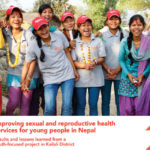
This brief presents results and lessons learned from a youth-focused project in Kailali District implemented between 2012 and 2014. The project demonstrated that, working in consultation with health-care providers and other adults, young people can play a meaningful—even essential—role in improving the quality of sexual and reproductive health services for young people. It also showed that young people, with appropriate training and support, can effectively inform and counsel their peers about sexual and reproductive health and rights, including abortion.
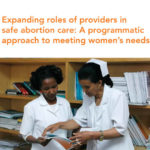
This brief examines the key results from expanding abortion service provision to midlevel providers in 10 Ipas country programs throughout Asia and Africa, including a global analysis of programmatic data from all 10 countries and two case studies (Ethiopia and Bangladesh).

